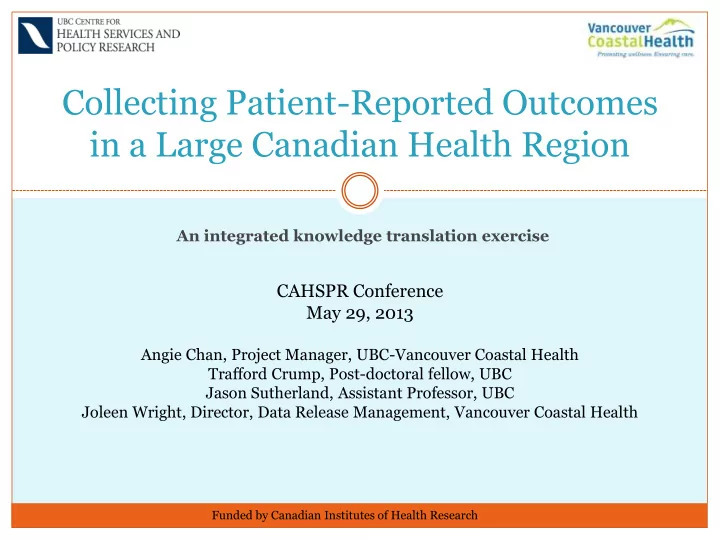

Collecting Patient-Reported Outcomes in a Large Canadian Health Region An integrated knowledge translation exercise CAHSPR Conference May 29, 2013 Angie Chan, Project Manager, UBC-Vancouver Coastal Health Trafford Crump, Post-doctoral fellow, UBC Jason Sutherland, Assistant Professor, UBC Joleen Wright, Director, Data Release Management, Vancouver Coastal Health Funded by Canadian Institutes of Health Research
iKT Conceptual Framework: Four Factors Research Question 1. Project responds to a problem or knowledge gap identified by knowledge users Research Approach 2. Research team engages knowledge users in informing the research plan Feasibility 3. The ‘ right ’ knowledge users are participating Knowledge users are committed to supporting the project appropriately Knowledge users are committed to considering the application of findings Outcomes 4. Engage knowledge users in interpreting results and informing KT plan Guide to Knowledge Translation Planning at CIHR: Integrated and End of-Grant Approaches. 2012. Canadian Institutes of Health Research. http://www.cihr-irsc.gc.ca/e/45321.html
Mark Chase Executive Director, Decision Support, VCH
Dr. Kevin Wing Orthopaedic surgeon, Foot and Ankle clinic, St. Paul ’ s Hospital, Vancouver
• Working through stakeholder concerns • Enabling partner participation
Methods Key Outreach Discussion Stakeholders Interests RSEC Meetings Concerns Procedures Clinicians Instruments Applications Presentations Operational directors Other Facilitated by Project Manager
Results Short term Research questions and approach relevant to stakeholders Changes in protocol to accommodate the needs of surgeons Clinical and administrative stakeholder buy-in Effective communication between researchers and knowledge users Long term Surgeon engagement, trust, mutual support, foundation for future collaboration
Conclusions iKT is about relationship building! iKT requires flexibility and adaptability. THANK YOU
Recommend
More recommend